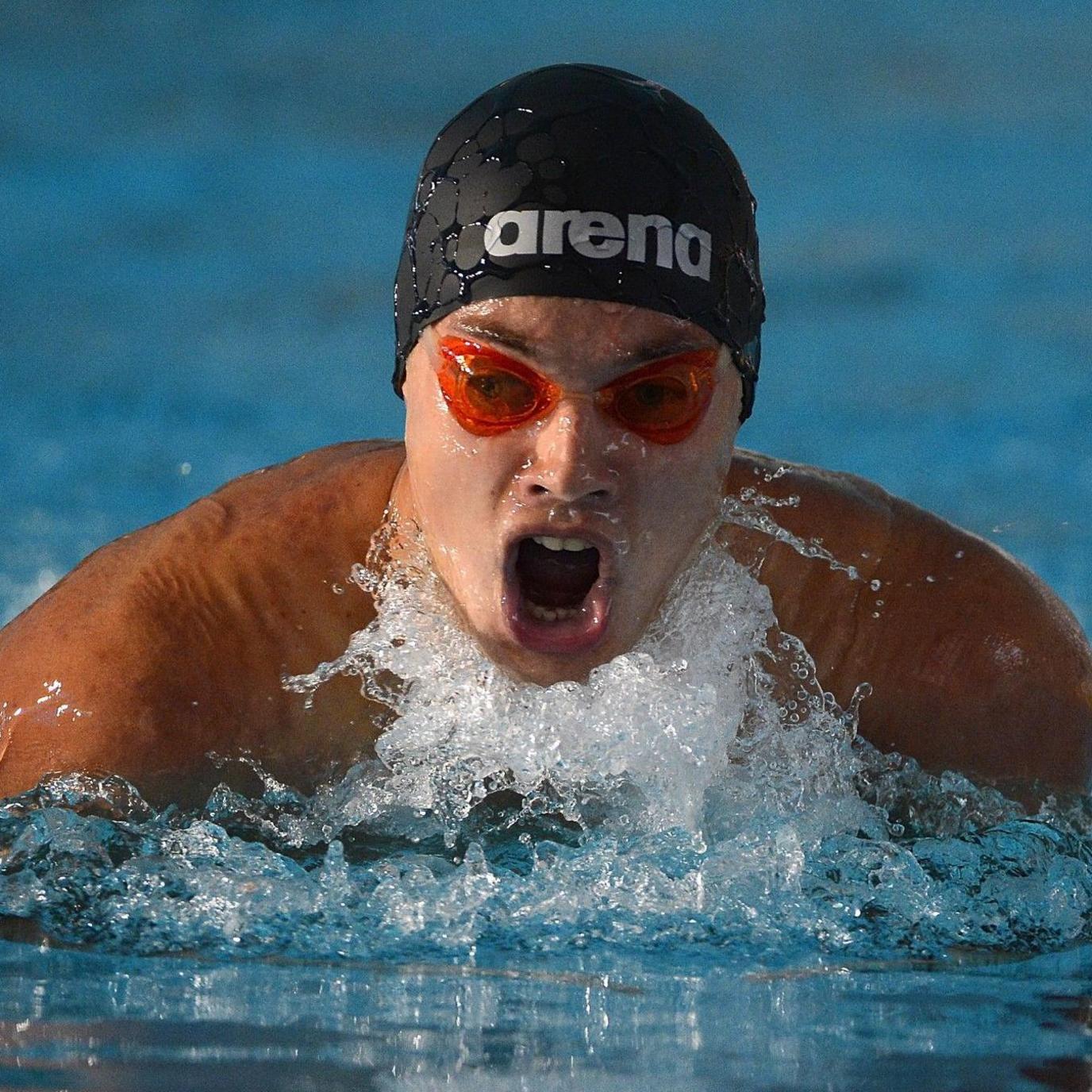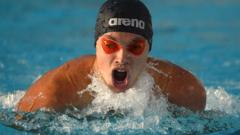
“I was ready to die. The probability of dying was so high that you had to come to terms with it.”
In 2022, Danylo Chufarov’s home city of Mariupol was under siege. For three weeks, as the shells rained down around him, he survived on little food, no electricity and rain water.
His home was destroyed, along with most of his possessions. He didn’t train for six months.
But, in 2023, he became a triple world champion – the best results of his long swimming career.
He was nominated for the prestigious Laureus Awards, posing for photos on the red carpet with tennis star Novak Djokovic and Real Madrid and England midfielder Jude Bellingham.
Now the swimmer, who is visually impaired, is hoping to become a Paralympic champion.
“We can show we are ready to fight,” he smiles. “My country shall fight on the battlefield – and we shall fight in sport. That’s our mission.”
Image source, Supplied
Chufarov poses with 24-time major winner Novak Djokovic in April
Ukraine’s Paralympic success is one of sport’s more startling anomalies.
As a general rule, the Paralympic medal table broadly mirrors that of the Olympics.
At the last summer Paralympics in Tokyo, China, Great Britain, the USA, Russia (competing as the Russian Paralympic Committee) and the Netherlands were the best performing nations.
A month before, they had all finished in the top seven in the Olympic medal table.
But next on the Paralympic list was Ukraine.
They won 98 Paralympic medals in Tokyo, putting them sixth.
And yet at the Olympics just a few weeks earlier, they had finished 44th.
This was far from a one-off. In fact, Ukraine can claim to be the most consistently successful Paralympic nation in the world.
At the last 10 Paralympic Games – summer and winter – since 2004, Ukraine have finished in the top six in every single medal table.
No other country in the world has done that.
They competed at the 2022 Winter Games despite their country being invaded just a few days earlier.
After a four-day journey to Beijing, images of their athletes chanting “peace for Ukraine” resonated around the world, external.
Somehow, they went on to finish second in the medal table, ahead of traditional winter sport powerhouses such as France, Canada and the United States.
Image source, Getty Images
The 2022 Winter Paralympics began a little over a week after Russia’s full-scale invasion of Ukraine. Valeriy Sushkevych, president of the country’s Paralympic Committee, was part of Ukraine’s protests at the Games
The challenges that Ukraine’s athletes have faced since 2022 are all too stark.
Chufarov says the effects of his experiences in Mariupol will never leave him.
“I lost a few kilos but that doesn’t reflect my mental state when I left the city. I believe that this trauma will stay with me forever,” he says.
He now trains in a swimming pool near Dnipro. It is one of the few facilities near him that have not been destroyed or occupied by the Russian army.
However, it is less than 100 miles from the front line.
“There are air-raid alarms all the time,” he says. “We have to escape to the bomb shelters – and there are electricity shortages too. These are the conditions we have to train in.”
Image source, Supplied
Chufarov’s flat in an apartment block in Mariupol was destroyed by Russian shelling
The man behind Ukraine’s extraordinary success is the president of their Paralympic Committee, Valeriy Sushkevych.
He developed a programme called Invasport, which created specialist facilities for disability sport in every region of the country.
However, that infrastructure, like much else in Ukraine, has been badly damaged.
Sushkevych says 500 of Ukraine’s disabled sports facilities have been destroyed.
He describes preparations for the Paris Paralympics as “terrible”, with athletes sleep-deprived from air-raid sirens sounding through the night.
“There’s physical danger from bombs and rockets every day – every hour sometimes,” he says.
“What kind of preparation can we talk about when people training outdoors see rockets flying – and know these rockets are flying to kill people and kill their relatives?”
He says repeating Ukraine’s success in recent Games will be difficult.
“Victory often depends on the emotion of the athlete. Say, for example, an athlete about to start their competition finds out that 10 minutes earlier, there was an air attack in Ukraine near their family.
“Our athletes will need to be strong like our soldiers.”
A lot of athletes have been forced abroad, with all the inevitable personal stress and disruption to training, especially as their coaches often can’t go with them.
Twenty-year old swimmer Anna Hontar now lives in Finland after escaping from the occupied city of Kherson.
Trapped inside her house for a month, her father made her an improvised gym.
“He put rubber over some rails on the wall and I could imitate freestyle, butterfly and backstroke,” she says.
“It was too dangerous to go outside. There was fighting on the streets.”
Image source, Getty Images
Hontar won 50m freestyle S6 bronze at the Tokyo Paralympics and has taken gold in the event at the two subsequent World Championships in Madeira and Manchester
Arriving in Finland, her biggest shock was the quantity of snow – “In Ukraine, we get just a little bit, but it was so high” – but her swimming doesn’t seem to have suffered. Like Chufarov, she also won gold at the World Championships in Manchester last year.
Those championships didn’t feature any Russian swimmers, who were banned from competing. At the Paralympics in Paris, that’s set to change.
The International Paralympic Committee say it is expecting 90 Russian athletes to compete as neutrals. At the Olympics earlier in the summer, only 15 Russian athletes took part.
Competing against Russian rivals will not be easy.
“They killed our children, people out on the streets and in the houses where they lived,” says Hontar.
“Swimming is not political – but maybe their parents, their uncles or their fathers have gone in to our country. It is so difficult.”
I ask her whether this gives her an extra motivation to win at the Paralympics. “Yes” she replies instantly, her eyes suddenly flashing with determination. “I want to fight for Ukraine, for my family and for our Paralympic team. I want to fight.”
Image source, Supplied
Hontar has relocated to Finland from Kherson. The city was captured in the early days of the war as Russian forces swept west from occupied Crimea. It was liberated by Ukraine eight months later but is still under attack
Other athletes have found their own ways to contribute to the war effort. Wheelchair fencer Andrii Demchuk crossed the border to Poland with his wife and two children after the invasion.
After settling his family in Warsaw, he began helping other Ukrainian refugees. He ferried them from the border to the Polish capital, before returning with tents, sleeping bags and equipment for the Ukrainian army.
He also delivered jeeps to the border – albeit in unconventional style. As a leg amputee, Demchuk normally drives an automatic. The jeeps were manual.
“It was a bit of a problem because I don’t have a leg to push the clutch,” he says.
So – ingeniously – he used his fencing sword instead. “A broken rapier can push the clutch perfectly,” he explains, demonstrating his technique with an imaginary sword.
“I delivered seven jeeps this way.”
Together with two Polish fencing friends, Grzegorz Pluta and Stefan Makowski, he also began visiting local schools.
“We realised we needed to bring Polish and Ukrainian children together,” Demchuk says.
“The Ukrainian kids were traumatised – and there were some differences.”
They visited around 40 schools – and talked to about 10,000 children.
“We wanted to show the kids how sport can take your mind off your problems and that people who are disabled don’t give up and can still break barriers.”
At this point, Demchuk realised that if he didn’t return to training, he wouldn’t qualify for the Paralympics, so Pluta and Makowski invited him to train at their club in Warsaw.
Most of Ukraine’s Para-fencers are in similar circumstances, having had to leave their homeland. Demchuk trained one of his team-mates – Nadiia Doloh – after her coach was unable to follow her to Poland.
Despite the disruption, Ukraine’s Para-fencing team finished top of the medal table at this year’s European Championships.
Image source, Supplied
Demchuk gives an exhibition on Para-fencing at a school in Poland
Demchuk has since returned to his home city of Lviv, where he’s taken on another role at the military hospital. He speaks to injured servicemen about adapting to life with a prosthetic.
“I tell them that life goes on – and you don’t need to be worried,” he says.
“Don’t get depressed, don’t take to alcohol or other substances – just be active from the start. I won them over because I’m a sportsman and an amputee, so they trusted me.”
And while his thoughts are now focused on Paris, they’re also focused on his countrymen. After he won a gold medal at the Rio Paralympics in 2016, he dedicated his triumph to two friends who had been been killed during Russia’s earlier incursions into the Donbas region.
Demchuk says he has lost many more friends during the current conflict.
Will he be thinking of them when he competes in Paris?
“The problem is, if I think about my friends – and about the war – I won’t win because of the emotions…. ” he says, his voice briefly faltering.
“In fencing, if you have this emotion, it’s not good. You’ll lose the fight before you even start.”
But if you were to win a medal?
He clasps his hands together, smiles and looks to the skies.
“I hope,” he says.







